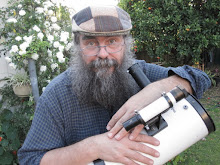Tuesday, June 25, 2019
The Sky This Week - Thursday June 27 to Thursday July 4
The New Moon is Wednesday July 3. Mars is
visible low in
the evening twilight with Mercury above it. On July 4 the thin crescent Moon is close to Mars, forming a triangle with Mercury.
Jupiter is easily visible as the brightest object in
the evening skies. Saturn
climbs higher in the late evening
skies as it approaches opposition. Venus is closing in on the
horizon and this is the last week to see it in the morning before it disappears into the dawn glow. On July 2 Venus and the thin crescent Moon are just visible together low in the twilight glow.
The New Moon is Wednesday July 3.
Morning sky on Tuesday, July 2 looking east as seen from
Adelaide at 6:56 ACST (30 minutes before sunrise). Venus and the crescent Moon are visible together just above the horizon.
Similar views will be seen elsewhere in Australia at the equivalent local time (30 minutes before sunrise, click to embiggen).
Sky at 20:00 ACST on Saturday, June 29 looking east as seen from
Adelaide. Jupiter is just after opposition, and high above
the eastern horizon with Saturn below. The left
upper insert inset shows the telescopic
view of Jupiter at this time. The left lower insert that of Saturn.
Similar views will be seen elsewhere in Australia at the equivalent local time, click to embiggen.
Evening sky on Thursday, July 4 as seen looking north-west from
Adelaide
at 18:12 ACST (60 minutes after sunset). Mars is close to the thin crescent Moon, making a triangle with Mercury.
Similar views will be seen throughout Australia at the equivalent local time (60 minutes after sunset, click to embiggen).
Venus is still low in the morning twilight. This is the last week to see it in the morning before it dissapears into the dawn glow. On July 2 Venus and the thin crescent Moon are just visible together low in the twilight glow
Mercury climbs higher in the evening twilight, heading away from Mars, but is still best seen with a level, clear horizon. On July 4 Mercury makes a thin triangle with Mars and the thin crescent Moon.
Jupiter Jupiter was at opposition, when it was biggest and brightest as seen from Earth, on July the 11th. However it is well worth observing for some time after opposition. It is visible all night long and is a good telescope target in the evening, being highest above the northern horizon around 11 pm.
Mars is in Gemini below brighter Mercury, during the week Mercury leaves Mars further behind. On July 4 Mars is close to the thin crescent Moon, making a triangle with Mercury.
Saturn climbs higher in the evening sky, it is best for telescopic viewing from just around 11 pm local time until the early morning.
Printable PDF maps of the Eastern sky at 10 pm AEST, Western sky at 10 pm AEST. For further details and more information on what's up in the sky, see Southern Skywatch.
Cloud cover predictions can be found at SkippySky.
Here is the near-real time satellite view of the clouds (day and night) http://satview.bom.gov.au/
The New Moon is Wednesday July 3.
Similar views will be seen elsewhere in Australia at the equivalent local time (30 minutes before sunrise, click to embiggen).
Similar views will be seen elsewhere in Australia at the equivalent local time, click to embiggen.
Similar views will be seen throughout Australia at the equivalent local time (60 minutes after sunset, click to embiggen).
Venus is still low in the morning twilight. This is the last week to see it in the morning before it dissapears into the dawn glow. On July 2 Venus and the thin crescent Moon are just visible together low in the twilight glow
Mercury climbs higher in the evening twilight, heading away from Mars, but is still best seen with a level, clear horizon. On July 4 Mercury makes a thin triangle with Mars and the thin crescent Moon.
Jupiter Jupiter was at opposition, when it was biggest and brightest as seen from Earth, on July the 11th. However it is well worth observing for some time after opposition. It is visible all night long and is a good telescope target in the evening, being highest above the northern horizon around 11 pm.
Mars is in Gemini below brighter Mercury, during the week Mercury leaves Mars further behind. On July 4 Mars is close to the thin crescent Moon, making a triangle with Mercury.
Saturn climbs higher in the evening sky, it is best for telescopic viewing from just around 11 pm local time until the early morning.
Printable PDF maps of the Eastern sky at 10 pm AEST, Western sky at 10 pm AEST. For further details and more information on what's up in the sky, see Southern Skywatch.
Cloud cover predictions can be found at SkippySky.
Here is the near-real time satellite view of the clouds (day and night) http://satview.bom.gov.au/
Labels: weekly sky







 Click to read about or order
Click to read about or order Click to read about or order
Click to read about or order Click to read about or order
Click to read about or order Click to read about or order
Click to read about or order




